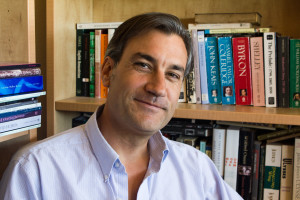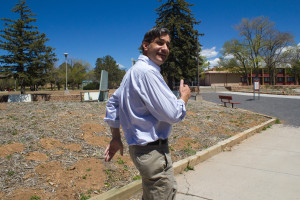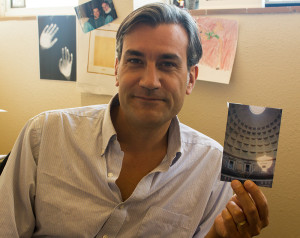Tags
Related Posts
Share This
Due for Donovan

Author and Co-Chair of the Creative Writing Department Matt Donovan in front of his bookshelves. Photo by Charlotte Martinez
“There was a lot happening in the world that felt like the sky was falling,” says Creative Writing and Literature Department Co-chair Matt Donovan, recalling the year 2007, when he began his chapbook manuscript. “At the same time,” Donovan continues, noting his son Cyrus’ birth the same year, “there was this incredible sense of promise, and excitement, and exhilaration, and happiness through the sheer joy of being a dad and seeing this life in the new world.”
Since then, Donovan explains, his manuscript has gone through many edits and re-sequencing and was recently named winner of Tupelo Press’ 2015 Snowbound Chapbook award, a contest awarding $1,000 and a national chapbook publication. Nine years in the making, Donovan’s poetry collection, Ten Burnt Lakes, will be out in bookstores in 2016.
“I got an email on the eve of going to Legoland with my kids,” Donovan says, recalling the day of Tupelo Press’ award notification. “So [the kids are] flipping out about Legoland and I’m flipping out about Legoland, but also about this prize. Legoland trumps poetry, I think, in that demographic.”
Shortly before the Tupelo announcement, Donovan learned that his lyric essay collection, A Cloud of Unusual Size and Appearance, had been accepted for publication by a press that will be announced in the coming weeks. The work was generated by Donovan in 2011-2012, during his time in Rome, Italy as a fellow for the prestigious Rome Fellowship in Literature by the Academy of Arts and Letters.
“With both the book of poems and the book of essays I had so many rejections,” Donovan says, still taking in the news of two 2016 publications, “and I had a number of close calls.” He adds that he feels both humbled and grateful for the double fortune but mostly really excited. He showed his excitement, for example, by gifting the judge of this year’s Tupelo’s contest Lia Purpura with a raven “fetish” made by a Zuni artist Salvador Romero. “She had an essay on coming back as a buzzard so I knew she would be all about the raven or the crow,” Donovan says. “She was really happy to receive that.”
In a closer inquiry regarding the content and themes of his works in Ten Burnt Lakes, Donovan explains that the poems were a gradual unveiling and he felt like his uncertainties with the world and the birth of his son grew more vivid. “I feel like a lot of the poems are wrestling with that inherit contradiction,” Donovan says, “the ways in which both that sense of joy and that sense of concern are colliding.”
In the writer’s opinion, that theme of contradiction was most represented by the artist Paul Cézanne who, despite being on his deathbed, wrote to an art merchant regarding a paint request. “It’s been eight days since I asked for ten burnt lakes,” Cézanne wrote.
“That for me is the core of this book,” Donovan says. “He knows he’s dying and yet in this letter that he’s writing to this paint merchant he is desperate to keep making beautiful vibrant exploratory things in the world.” Therefore, the first poem in the chapbook, “Still Life with Burnt Lake,” sets the appropriate stage for the collection.
Another poem that Donovan felt set the thematic patterns of the manuscript was one regarding the early days of his son. “[He’s] just this bellowing goomba,” Donovan says. “He’s tearing through the world and there are these blissful days and there’s a sense of the insularity of that [fatherly] job that I was trying to explore and what that means in the relationship to a larger experience of the world and a larger awareness of the difficulties the violence, the atrocities that other people are experiencing and trying to make sense of that. Not trying to excuse it or down play, but trying to make sense of that.”
The writer shares that he had a similar reaction to a section of Shakespeare’s The Tempest in which the text reads “Exit pursued by a bear,” a phrase that would become the poem’s title. “Just as [the character] discovers the new born baby, there is this completely inexcusable, indefensible, violent death of someone just off stage,” Donovan says. “And the shepherd even says something about ‘here’s a moment of things dying and things new born.’”
Similarly, in his John Singer Sargent poem Donovan is curious as to how the aristocratic New York artist—who spent time in the trenches of WWI—is able to find “incredible beauty in the flare of color or in the body of [the] soldiers.” In reading Sargent’s biography, Donovan discovered that the painter’s muse came when Sargent witnessed a scene of soldiers blinded by mustard gas. “He has a moment,” Donovan says, “and a response of empathy and pathos but also of exhilaration because he knows he’s found his theme. And he makes this incredible painting of a procession of these men who have been blinded and traumatized by their experience with the war. But as an artist, he’s still feeling this surge of intensity and engagement just on the level of aesthetics. I think that was one of the things I was trying to figure out in this collection as well.”
And when Donovan says “figuring out,” he admits that this description is appropriate too for his process of writing a poem. “It’s not the same as writing a novel where you can describe what’s taking place,” he says, “so much that happens in poetry is on the level of minutiae and the nuances of language. I will start writing a poem, normally based on something that I can’t relinquish; it feels like a little tug on the sleeve and it’s something I chase down, and explore, and my process involves a lot of flailing and fumbling…but gradually I start to have the themes revealed to me.” He explains that many times his inspirations and curiosities lead him to researching and taking notes. “I don’t really know what it’s all about until late in the game.”

Donovan “traveling” through campus; places to research, observations to make! Photo by Charlotte Martinez
While Donovan continued to write and publish poetry following his debut poetry collection, Vellum, he began shifting to lyric essays after he read a curious footnote regarding a possible occurrence at New Mexico’s Trinity Site, the testing grounds for the first atomic bomb.
The legend, Donovan explains, is that during the detonation test the radio signal broadcasting the countdown crossed with a radio station in California and for a few seconds Tchaikovsky’s “The Nutcracker Suite,” (Op. 71a) filled the airwaves before the countdown resumed and the bomb exploded.
“So I wrote a poem that locked into one particular idiosyncratic footnote,” Donovan says, “but it never felt resolved to me and there was something about the compression of poetry by virtue of necessity that stopped me from being able to ask the right questions about that moment.” After attending an open house at Trinity Site, Donovan says he discovered that the poetic form was serving, in this case, as a constraint rather than something that was assisting his creative process.
“And it was this transition into the lyric essay form,” Donovan says, “which obviously had so many connections with poetry.” He describes how the acts of interrogation and historical research was necessary to come to terms with some of the material. “And from there I just became interested in the essay form and what it was affording me…without having to worry about things like line breaks.”
While in Rome, Donovan explains also how his interest with the theme of beauty within destruction continued and brought him, for example, to Pompeii and to the relics and frescos that stood after the atrocity of Rome’s erupted volcano. Sharing German writer Johann Wolfgang von Goethe’s quote, “no catastrophe has ever yielded so much pleasure to the rest of humanity,” Donovan says that he believed Goethe’s observation on Pompeii was a “fascinating” statement to think about, as was the statement made by Roman author Pliny the Younger who described the clouds before the eruption of Vesuvius as having an “unusual size and appearance.” This would become the title of his lyric essay collection.
“I’m interested in the observer’s stance in that moment,” Donovan says, “because here is this moment of apocalypse, but within that phase there is aesthetic interest, there is the observer struck by the visual component of this moment that signifies a town’s defamation.”
And while Donovan produced six essays on his interest on Pompeii, his longest essay is on the Pantheon, a well preserved structure from ancient Rome.

Donovan’s longest essay, “Almost a Full Year of Stone, Light, and Sky,” covers the mystery of the Pantheon in Rome. Photo by Charlotte Martinez
“I would just go in every chance I got,” Donovan says, remembering the 20-minute walk to the Pantheon from where he was staying in Rome. “[I would] look at the light in the fall, and the winter, when it was raining, when it was snowing. I became increasingly obsessed with that space.” And while conducting his research, the writer says he became struck about how little information there was on the structure. “That lack of knowing actually seems to serve the viewer and that experience,” Donovan says. “To just go in and experience light and sky without any understanding of the historical background I think is a great artistic experience to have. Exhilarating.” Excerpts from the essay entitled “Almost a Full Year of Stone, Light, and Sky,” can be read on Blackbird’s online journal.
Even with two publications on the horizon, however, Donovan has not loosened his literary reins. In fact, while in Rome, Donovan’s passion for Japanese Haiku lead to a friendship with composer Lei Liang, who subsequently offered Donovan the opportunity to write the libretto for a developing chamber opera. Tentatively, Donovan describes the story as an exploration of mysteries of the Winchester home and the rifle fortune left to Sarah Winchester. His intention, Donovan shares, is to create connections between the story of the Winchester house (which is said to be haunted) and the horrors of contemporary school shootings.
“It’s actually helping me get back to the poetry too because it is almost entirely in first person,” Donovan says, “I’ve just written a draft that I’m about to send in this week.”
Donovan also has previously received awards from National Endowment of the Arts (2004) and the Pushcart Prize (2008). His work has appeared in numerous literary magazines, including Blackbird, The Kenyon Review and The ThreePenny Review.






 Jackalope Magazine is the student magazine of Santa Fe University of Art and Design. Building on the interdisciplinary nature of our education, we aim to showcase the talent of our university and character of our city.
Jackalope Magazine is the student magazine of Santa Fe University of Art and Design. Building on the interdisciplinary nature of our education, we aim to showcase the talent of our university and character of our city.
Recent Comments